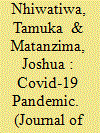|
|
|
Sort Order |
|
|
|
Items / Page
|
|
|
|
|
|
|
| Srl | Item |
| 1 |
ID:
193191


|
|
|
|
|
| Summary/Abstract |
Man-made reservoirs are constructed to meet certain purposes and Lake Kariba, Zimbabwe, was designed for hydroelectric power generation. However, it has developed other multiple uses, and the growth of fisheries on the lake has had a significant impact on the livelihoods of local communities. The declaration of Covid-19 as a pandemic in Zimbabwe in March 2020 was quickly followed by the imposition of national lockdowns with varying levels of severity up to the present day. This was done to curtail the spread of the disease, meanwhile enhancing the nation’s capacity in terms of acquiring testing kits, constructing more admission and quarantine centres as well as educating the people about ways to keep safe. In response to the calls by the government to monitor the movement of people and compliance of the lockdown rules, the Zimbabwe National Parks and Wildlife Management Authority (ZNPWMA), the governing body of the Lake Kariba fisheries, imposed rules that have significantly impacted the fishing communities at Lake Kariba. Both gillnet fishers and rod and line fishers have been impacted, but our focus here is on women rod and line fishers. Using the precarious livelihoods conceptual frameworks, we show how the changes in water management during the Covid-19 pandemic lockdowns has generated high levels of precariousness on the livelihoods of women at Kariba. We define precariousness as the condition of uncertainties brought to the women fishers by changes in water restrictions. The precarity of women was induced by several factors. For instance, the women fishers reported that restrictions to accessing fish in areas with high catches impacted them. They are also now obliged to pay exorbitant fishing fees in a way to discourage them to fish; they were frequently chased away from the Lake by ZNPWMA officers; they had limited amount of time to fish due to curfews; and failure to comply results in heavy fines imposed on them among other challenges. We show how these challenges interact with the current Zimbabwe socio-economic crisis to worsen the precariousness and vulnerability of women fishers at Lake Kariba. Data presented in this manuscript are based on participant observation and interviews with women fishers at Lake Kariba.
|
|
|
|
|
|
|
|
|
|
|
|
|
|
|
|
| 2 |
ID:
194878


|
|
|
|
|
| Summary/Abstract |
The tourism industry sustains the economies of many nations across the globe through contributing to the Gross Domestic Products (GDP); creation of employment and infrastructure development. However, its sustainability is vulnerable to various temporal and spatial environmental, socio-economic and political events. In the Zimbabwe case, the politico-economic crises of the 2000s and the COVID-19 pandemic have variedly impacted on the prevalence of tourism with the actors (such as employees, tourists and recreational facility owners) involved in this industry having been seriously impacted. Using the precarity conceptual framework, this article critically analyses the impact of the politico-economic crises induced by the Fast Track Land Reform Programme of the early 2000s and the COVID-19 pandemic on the actors involved in tourism. Information regarding the impact of the political crises and COVID-19 pandemic on tourism in Kariba town is missing in the literature, yet Kariba is one of the most popular tourist destinations in Zimbabwe and Southern Africa. The article discusses the precarity of these tourism actors in the context of the politico-economic crises as well as the COVID-19 pandemic. We define ‘precarity’ as a condition of vulnerability and uncertainty. Our results indicate that for employees, these factors have resulted in uncertainty in the tourism business with some shutting down and others scaling down their operations resulting in redundancy and vulnerability of the workers. For tourists, the successive lockdowns and surge in COVID-19 cases in Zimbabwe resulted in (re)booking and (re)cancellation of bookings; the politico-economic crises resulted in fear among the potential clients and a drop in the number of international tourists. The recreational and accommodation service operators have had the challenge of making food (and other resources) orders for trips that are eventually cancelled due to the surge in the COVID-19 cases. The article draws from data gathered in 2021 through face-to-face interviews with different stakeholders in the tourism industry including employees, hotel and boat owners, Zimbabwe Tourism Authority officials and local politicians in Kariba resort town.
|
|
|
|
|
|
|
|
|
|
|
|
|
|
|
|
|
|
|
|
|